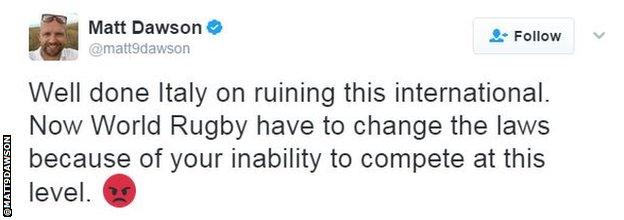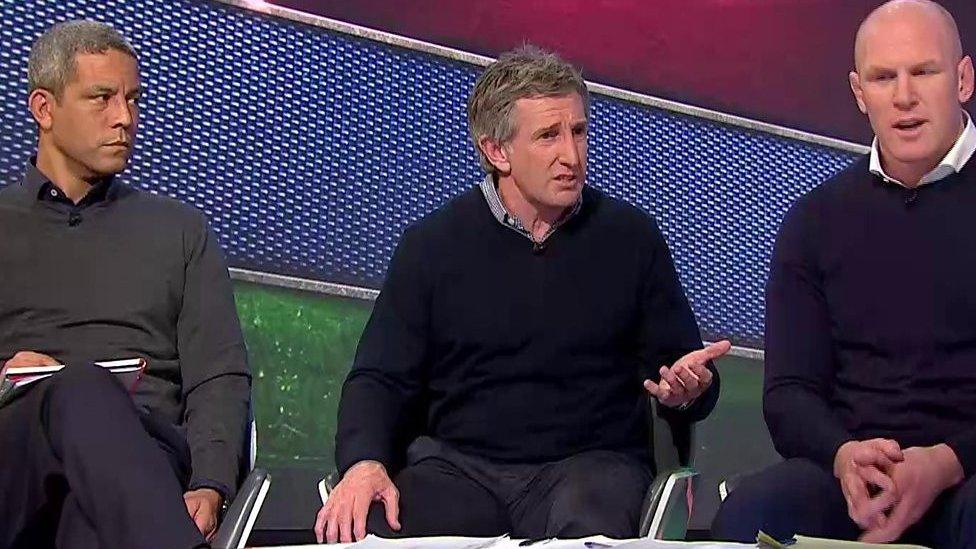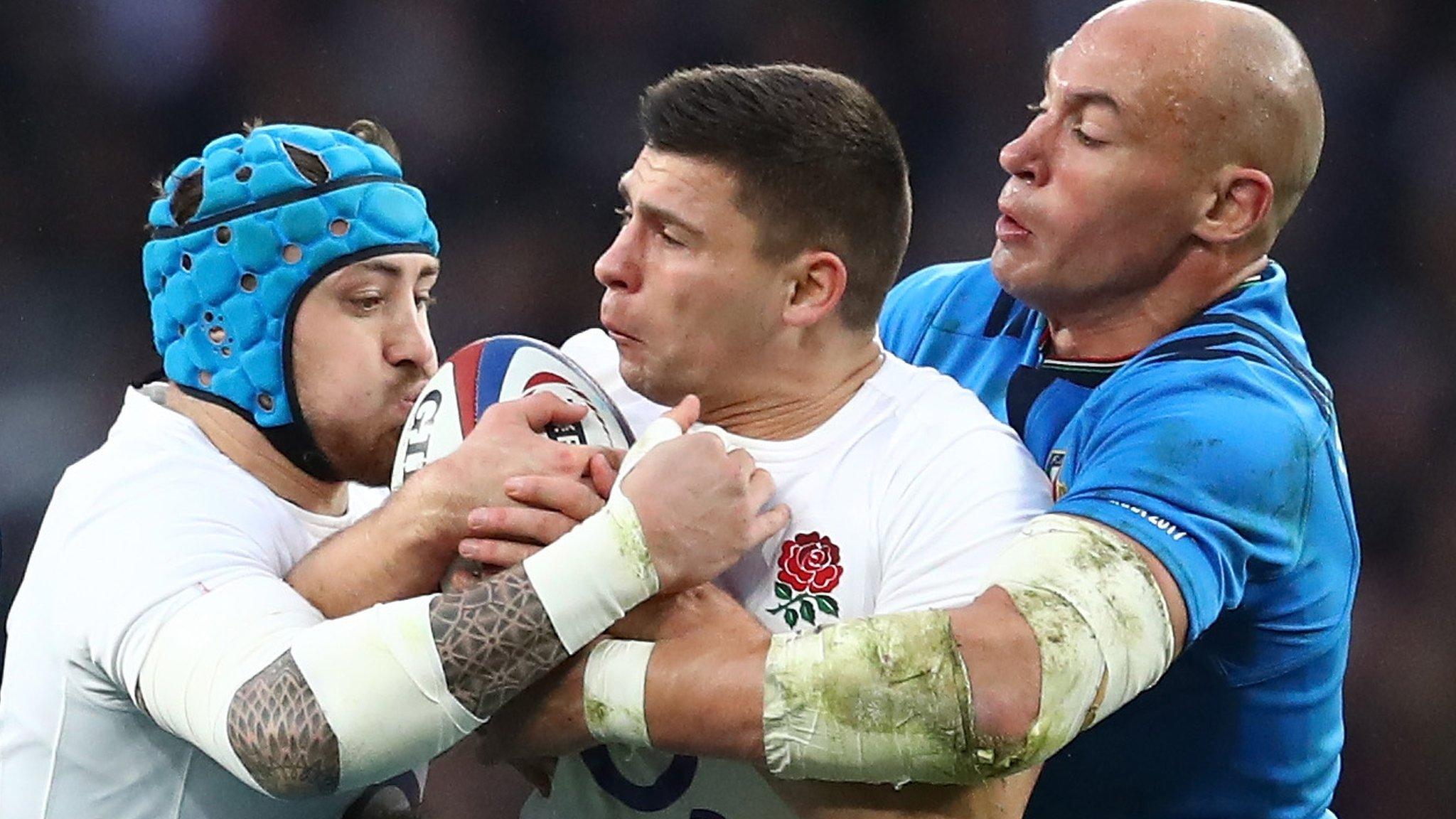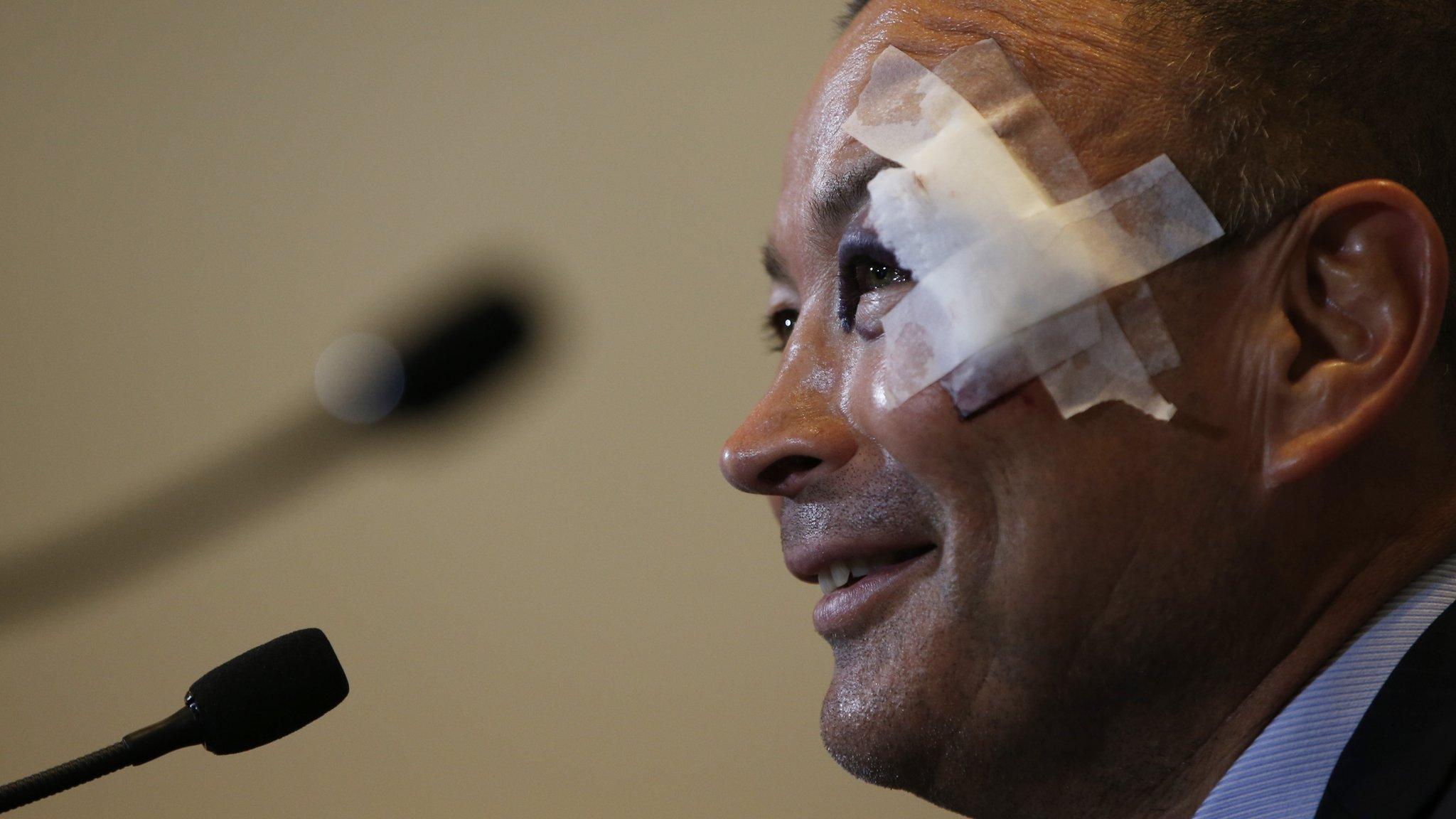Six Nations 2017: Italy's tactics test England - and Eddie Jones' patience - to the limit
- Published
- comments
And so another typically one-sided England v Italy match, a 23rd win for white over blue in 23 matches, as predictable a contest as there is in international sport.
Or maybe not. The scoreboard at the end might have looked familiar, and so too the championship standings: England winners 36-15, back on top of the Six Nations table, Italy with a third defeat in three, Wooden Spoon being readied once again.
Very little else was, once Italy had released their version of chaos theory upon the world.
It was a simple idea. Do not commit anyone to the breakdown after the initial tackle. No ruck is therefore formed. The offside law is thus irrelevant, and you can stand anywhere you like - between opposition scrum-half and fly-half, between 10 and 12, maybe on both sides of the scrum-half while pulling faces, if you fancy it.
Simple, and not actually that novel. The Chiefs have done it in Super Rugby. It can happen in Sevens. Australia captain David Pocock tried something similar against Ireland last autumn, and nearly created a try from it.
England, however, were as ready for it as Don Bradman was for Bodyline, or Scott Styris in 2008 when Kevin Pietersen swapped hands on his bat handle and switch-hit him for six. , external
On the pitch they were first confused, then angry, and for a long period then neutered. In the stands it was more demonstrative yet. There are few sights in rugby as striking as Twickenham Man in full red-cheeked fury, and on Sunday his fury was both righteous and often misplaced.
Italy were not acting illegally. Coach Conor O'Shea had run the tactic past referee Romain Poite on Saturday, and not only been given the all-clear but a little bit of advice too: to be within the spirit of the laws as well as the wording, do not get within a metre of the nine.

Ex-England scrum-half Matt Dawson was not impressed by Italy's tactics
Chaos is the science of surprises. England were surprised. Perhaps that was why O'Shea's opposite number Eddie Jones was still shaking afterwards.
"If you paid for a ticket you should ask for your money back," he said, eyes glinting, mouth spitting fire. "You haven't seen a game of rugby.
"If that's rugby then I'm going to retire. That's not rugby. You're looking to pass and all you can see is one of their players.
"I'm not critical of our side a bit because we didn't play rugby. We practised for a game of rugby all week and we didn't get it."
Jones compared it to cricketer Trevor Chappell's infamous underarm ball, external to New Zealand's Brian McKechnie in 1981 that won a one-day international match for Australia but cost them much more.
If that was inaccurate, not only because Chappell's gambit had not been discussed with the umpire but also because O'Shea's strategy ultimately ended in defeat, it was also a little sleight-of-hand of Jones' own.
England had an awful first half, their kicking from hand inaccurate, their discipline poor, their energy levels on a par with those who had enjoyed a full Sunday roast before watching from their sofas.
Centre Owen Farrell, on the occasion of his 50th cap, had arguably his least impressive game for his country. Nine penalties were conceded in the first 40 minutes alone. Had Italy kicked their penalties, the half-time deficit for the hosts could have been much worse than 10-5.
Chaos, the science of surprises. Shouldn't England have prepared for it happening, Jones was asked in his news conference?
"Prepared not to play rugby? Yeah, you're right. I should have prepared to play ten-pin bowling.
"When the nine can't pass the ball and the 10 can't see it, you can't play rugby. They brilliantly executed that game, and they got what they wanted, which was a close loss.
"I don't want to be involved in a game like that. I'd rather pick up my stumps, put them in my kit-bag and go home."
Italy match not proper rugby - Jones
Others remembered his defence coach Paul Gustard being asked about Pocock's move against Ireland before England faced the Wallabies a week later. His response: "We are aware of it, we saw it, and we will have a plan in place."
England did not have a plan for the first 40 minutes. When they did find a solution - exploit that lack of defensive cover by sending your scrum-half sniping, by sending runners up that unguarded middle - they took a hold of the game.
International sport is about being tested. It is about being tested, and it is about coming up with the answers.
Italy have gone for chaos before, when Nick Mallett picked flanker Mauro Bergamasco at scrum-half for the corresponding fixture in 2009. Chaos was what ensued,, external although not of the sort Mallett had hoped for.
This time the idea came from defence coach Brendan Venter, the same maverick thinker who came up with the plan to drop-goal England out of their World Cup quarter-final against his native Springboks in 1999.
"We're not inventing anything," said O'Shea afterwards, visibly angry at Jones' response. "It's a tackle. If it's a tackle, there's no offside there. We just occupied space.
"If that is people's take after today, that is a very sad take. Just because we took people by surprise. What do you want, us to be normal? We can't be normal. We're Italy.
"Rugby is there to do things different, and challenge people's minds. And that's what we did today - we challenged people's minds."
Innovation to one, an insult to the other. If the contest on the pitch had been as relentlessly combative as the news conferences afterwards, no-one would have dared go to the bars to get in the mid-match pints, as plenty were doing during England's somnolent first half.
"[Jones] wanted 70. He wanted to 'take us to the cleaners,'" said O'Shea, referencing Jones' comments in advance of the game.
"Is that respect? I was delighted when they kicked to the posts. If you think we're going to lie down, you're wrong.
"I loved it. I loved it today. We had to give hope to people, that we weren't just here to make up the numbers. Today you could say, we had enough. We're going to fight."
- Published26 February 2017

- Published26 February 2017

- Published26 February 2017

- Published17 March 2017

- Published25 January 2017
